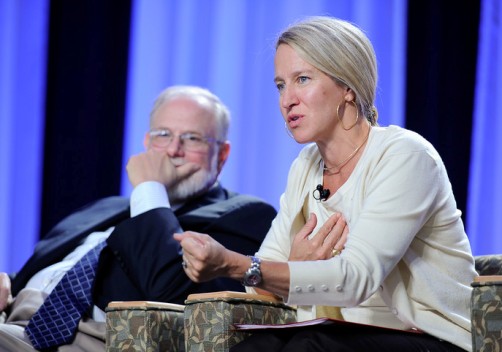In Convocation keynote, real-life tragedy illustrates the importance of quality care

Nearly 100,000 Americans die every year as a result of medical errors, making it the country’s fourth-leading cause of death. Among the casualties was 18-month-old Josie King. At yesterday’s Convocation, three keynote speakers—author Charles Kenney, Josie’s mother Sorrel King, and pediatrician George Dover, MD—explained how one family’s story of tragedy led to a new one of hope.
While heartbreaking at times, their discourse was compelling and on point for the current and future health care providers in attendance. Through their individual remarks and the interactive question-and-answer period that followed, Kenney, King and Dr. Dover made a unified call to action: learn to communicate, take personal responsibility and become leaders in avoiding preventable errors such as the one that cut young Josie King’s life short.
“As doctors and nurses, you are special people doing special work,” said Kenney, who recounted the Kings’ loss and the subsequent quality and safety improvement efforts at Johns Hopkins Children’s Center in his book The Best Practice. The book is the first to describe for lay readers how the new quality movement is transforming medicine, and was selected as the UMMS Summer Read (see sidebar). “You have enormous influence,” Kenney concluded. “We need you to transform the system so it improves your ability to do your work as healers.”
King recounted how, after their daughter’s death, she and her husband, Tony, came through anger and grief to establish the Josie King Foundation. With its mission to prevent others from dying or being harmed by medical errors, the foundation strives to create a culture of patient safety by uniting health care providers and consumers in the effort. Squeezing into 28 minutes the usual one-hour talk she delivers nationwide as an ardent patient safety advocate didn’t minimize the emotion in her remarks. “I look out at you and feel hopeful because you are the next generation, the new culture, the ones I so desperately hope will make things better,” said King. “I am not a doctor or a nurse, but the breakdown in communication that caused Josie’s death is something I understand. I am counting on you to communicate with your patients and each other.”
Pediatrician-in-chief at Johns Hopkins Children’s Center now and at the time of Josie’s death, Dover has also become an impassioned champion of health care quality and safety as a direct result of that experience. “I was responsible for that incident,” he recalled being his first reaction. Next was his decision to address the problems that led to Josie’s death, with the conviction that doing so was the most important thing he and his colleagues could do. Upon being asked what Johns Hopkins has done to improve patient safety in the eight years since Josie’s death, he cited specific examples, such as how patients and their families are proactively engaged as integral members of the care team. “We need them to know that they can help us take care of a patient,” Dover said.
In closing, King made an impassioned plea to the students of UMMS. “I hope when you go out and become leaders that you will do the right thing: apologize, tell the truth—and fix the problems.”